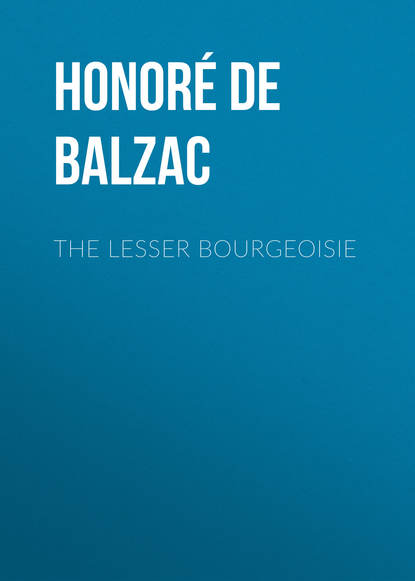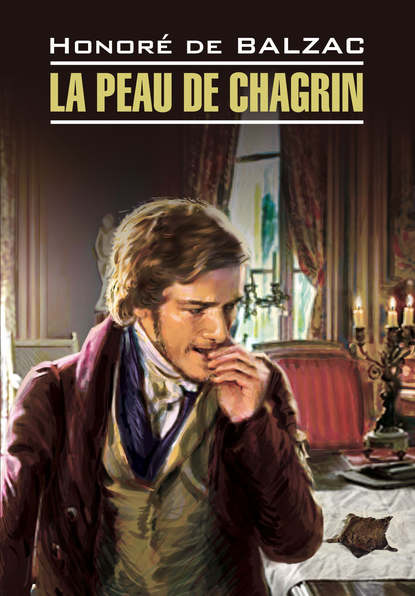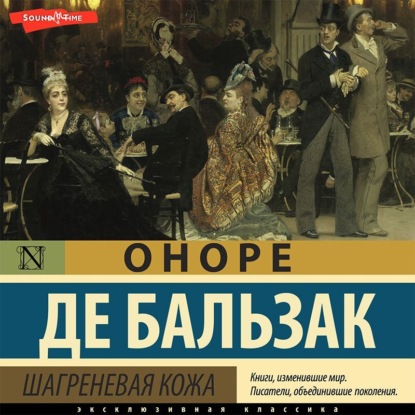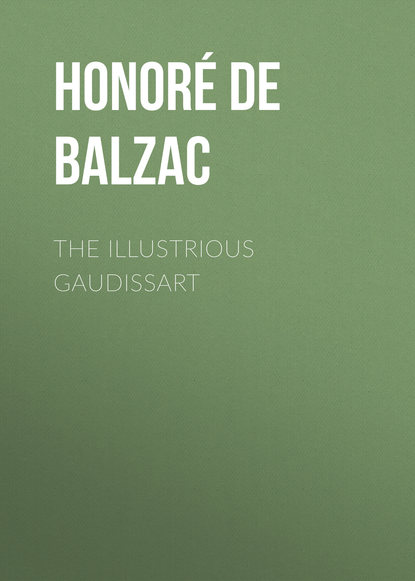
Полная версия
The Lesser Bourgeoisie
“He speaks well,” said Phellion to his neighbor Dutocq.
“And how strong the statement is!”
Envy had turned Minard and his son green and yellow.
“That is well said and very true,” remarked Minard.
“Unanimously adopted!” cried Colleville. “Messieurs, we are men of honor; it suffices to understand each other on this point.”
“Whoso desires the end accepts the means,” said Phellion, emphatically.
At this moment, Mademoiselle Thuillier reappeared, followed by her two servants; the key of the cellar was hanging from her belt, and three bottles of champagne, three of hermitage, and one bottle of malaga were placed upon the table. She herself was carrying, with almost respectful care, a smaller bottle, like a fairy Carabosse, which she placed before her. In the midst of the hilarity caused by this abundance of excellent things – a fruit of gratitude, which the poor spinster in the delirium of her joy poured out with a profusion which put to shame the sparing hospitality of her usual fortnightly dinners – numerous dessert dishes made their appearance: mounds of almonds, raisins, figs, and nuts (popularly known as the “four beggars”), pyramids of oranges, confections, crystallized fruits, brought from the hidden depths of her cupboards, which would never have figured on the table-cloth had it not been for the “candidacy.”
“Celeste, they will bring you a bottle of brandy which my father obtained in 1802; make an orange-salad!” cried Brigitte to her sister-in-law. “Monsieur Phellion, open the champagne; that bottle is for you three. Monsieur Dutocq, take this one. Monsieur Colleville, you know how to pop corks!”
The two maids distributed champagne glasses, also claret glasses, and wine glasses. Josephine also brought three more bottles of Bordeaux.
“The year of the comet!” cried Thuillier, laughing, “Messieurs, you have turned my sister’s head.”
“And this evening you shall have punch and cakes,” she said. “I have sent to the chemists for some tea. Heavens! if I had only known the affair concerned an election,” she cried, looking at her sister-in-law, “I’d have served the turkey.”
A general laugh welcomed this speech.
“We have a goose!” said Minard junior.
“The carts are unloading!” cried Madame Thuillier, as “marrons glaces” and “meringues” were placed upon the table.
Mademoiselle Thuillier’s face was blazing. She was really superb to behold. Never did sisterly love assume such a frenzied expression.
“To those who know her, it is really touching,” remarked Madame Colleville.
The glasses were filled. The guests all looked at one another, evidently expecting a toast, whereupon la Peyrade said: —
“Messieurs, let us drink to something sublime.”
Everybody looked curious.
“To Mademoiselle Brigitte!”
They all rose, clinked glasses, and cried with one voice, “Mademoiselle Brigitte!” so much enthusiasm did the exhibition of a true feeling excite.
“Messieurs,” said Phellion, reading from a paper written in pencil, “To work and its splendors, in the person of our former comrade, now become one of the mayors of Paris, – to Monsieur Minard and his wife!”
After five minutes’ general conversation Thuillier rose and said: —
“Messieurs, To the King and the royal family! I add nothing; the toast says all.”
“To the election of my brother!” said Mademoiselle Thuillier a moment later.
“Now I’ll make you laugh,” whispered la Peyrade in Flavie’s ear.
And he rose.
“To Woman!” he said; “that enchanting sex to whom we owe our happiness, – not to speak of our mothers, our sisters, and our wives!”
This toast excited general hilarity, and Colleville, already somewhat gay, exclaimed: —
“Rascal! you have stolen my speech!”
The mayor then rose; profound silence reigned.
“Messieurs, our institutions! from which come the strength and grandeur of dynastic France!”
The bottles disappeared amid a chorus of admiration as to the marvellous goodness and delicacy of their contents.
Celeste Colleville here said timidly: —
“Mamma, will you permit me to give a toast?”
The good girl had noticed the dull, bewildered look of her godmother, neglected and forgotten, – she, the mistress of that house, wearing almost the expression of a dog that is doubtful which master to obey, looking from the face of her terrible sister-in-law to that of Thuillier, consulting each countenance, and oblivious of herself; but joy on the face of that poor helot, accustomed to be nothing, to repress her ideas, her feelings, had the effect of a pale wintry sun behind a mist; it barely lighted her faded, flabby flesh. The gauze cap trimmed with dingy flowers, the hair ill-dressed, the gloomy brown gown, with no ornament but a thick gold chain – all, combined with the expression of her countenance, stimulated the affection of the young Celeste, who – alone in the world – knew the value of that woman condemned to silence but aware of all about her, suffering from all yet consoling herself in God and in the girl who now was watching her.
“Yes, let the dear child give us her little toast,” said la Peyrade to Madame Colleville.
“Go on, my daughter,” cried Colleville; “here’s the hermitage still to be drunk – and it’s hoary with age,” he added.
“To my kind godmother!” said the girl, lowering her glass respectfully before Madame Thuillier, and holding it towards her.
The poor woman, startled, looked through a veil of tears first at her husband, and then at Brigitte; but her position in the family was so well known, and the homage paid by innocence to weakness had something so beautiful about it, that the emotion was general; the men all rose and bowed to Madame Thuillier.
“Ah! Celeste, I would I had a kingdom to lay at your feet,” murmured Felix Phellion.
The worthy Phellion wiped away a tear. Dutocq himself was moved.
“Oh! the charming child!” cried Mademoiselle Thuillier, rising, and going round to kiss her sister-in-law.
“My turn now!” said Colleville, posing like an athlete. “Now listen: To friendship! Empty your glasses; refill your glasses. Good! To the fine arts, – the flower of social life! Empty your glasses; refill your glasses. To another such festival on the day after election!”
“What is that little bottle you have there?” said Dutocq to Mademoiselle Thuillier.
“That,” she said, “is one of my three bottles of Madame Amphoux’ liqueur; the second is for the day of Celeste’s marriage; the third for the day on which her first child is baptized.”
“My sister is losing her head,” remarked Thuillier to Colleville.
The dinner ended with a toast, offered by Thuillier, but suggested to him by Theodose at the moment when the malaga sparkled in the little glasses like so many rubies.
“Colleville, messieurs, has drunk to friendship. I now drink, in this most generous wine, To my friends!”
An hurrah, full of heartiness, greeted that fine sentiment, but Dutocq remarked aside to Theodose: —
“It is a shame to pour such wine down the throats of such people.”
“Ah! if we could only make such wine as that!” cried Zelie, making her glass ring by the way in which she sucked down the Spanish liquid. “What fortunes we could get!”
Zelie had now reached her highest point of incandescence, and was really alarming.
“Yes,” replied Minard, “but ours is made.”
“Don’t you think, sister,” said Brigitte to Madame Thuillier, “that we had better take coffee in the salon?”
Madame Thuillier obediently assumed the air of mistress of the house, and rose.
“Ah! you are a great wizard,” said Flavie Colleville, accepting la Peyrade’s arm to return to the salon.
“And yet I care only to bewitch you,” he answered. “I think you more enchanting than ever this evening.”
“Thuillier,” she said, to evade the subject, “Thuillier made to think himself a political character! oh! oh!”
“But, my dear Flavie, half the absurdities of life are the result of such conspiracies; and men are not alone in these deceptions. In how many families one sees the husband, children, and friends persuading a silly mother that she is a woman of sense, or an old woman of fifty that she is young and beautiful. Hence, inconceivable contrarieties for those who go about the world with their eyes shut. One man owes his ill-savored conceit to the flattery of a mistress; another owes his versifying vanity to those who are paid to call him a great poet. Every family has its great man; and the result is, as we see it in the Chamber, general obscurity of the lights of France. Well, men of real mind are laughing to themselves about it, that’s all. You are the mind and the beauty of this little circle of the petty bourgeoisie; it is this superiority which led me in the first instance to worship you. I have since longed to drag you out of it; for I love you sincerely – more in friendship than in love; though a great deal of love is gliding into it,” he added, pressing her to his heart under cover of the recess of a window to which he had taken her.
“Madame Phellion will play the piano,” cried Colleville. “We must all dance to-night – bottles and Brigitte’s francs and all the little girls! I’ll go and fetch my clarionet.”
He gave his empty coffee-cup to his wife, smiling to see her so friendly with la Peyrade.
“What have you said and done to my husband?” asked Flavie, when Colleville had left them.
“Must I tell you all our secrets?”
“Ah! you don’t love me,” she replied, looking at him with the coquettish slyness of a woman who is not quite decided in her mind.
“Well, since you tell me yours,” he said, letting himself go to the lively impulse of Provencal gaiety, always so charming and apparently so natural, “I will not conceal from you an anxiety in my heart.”
He took her back to the same window and said, smiling: —
“Colleville, poor man, has seen in me the artist repressed by all these bourgeois; silent before them because I feel misjudged, misunderstood, and repelled by them. He has felt the heat of the sacred fire that consumes me. Yes I am,” he continued, in a tone of conviction, “an artist in words after the manner of Berryer; I could make juries weep, by weeping myself, for I’m as nervous as a woman. Your husband, who detests the bourgeoisie, began to tease me about them. At first we laughed; then, in becoming serious, he found out that I was as strong as he. I told him of the plan concocted to make something of Thuillier, and I showed him all the good he could get himself out of a political puppet. ‘If it were only,’ I said to him, ‘to make yourself Monsieur de Colleville, and to put your charming wife where I should like to see her, as the wife of a receiver-general, or deputy. To make yourself all that you and she ought to be, you have only to go and live a few years in the Upper or Lower Alps, in some hole of a town where everybody will like you, and your wife will seduce everybody; and this,’ I added, ‘you cannot fail to obtain, especially if you give your dear Celeste to some man who can influence the Chamber.’ Good reasons, stated in jest, have the merit of penetrating deeper into some minds than if they were given soberly. So Colleville and I became the best friends in the world. Didn’t you hear him say to me at table, ‘Rascal! you have stolen my speech’? To-night we shall be theeing and thouing each other. I intend to have a choice little supper-party soon, where artists, tied to the proprieties at home, always compromise themselves. I’ll invite him, and that will make us as solidly good friends as he is with Thuillier. There, my dear adorned one, is what a profound sentiment gives a man the courage to produce. Colleville must adopt me; so that I may visit your house by his invitation. But what couldn’t you make me do? lick lepers, swallow live toads, seduce Brigitte – yes, if you say so, I’ll impale my own heart on that great picket-rail to please you.”
“You frightened me this morning,” she said.
“But this evening you are reassured. Yes,” he added, “no harm will ever happen to you through me.”
“You are, I must acknowledge, a most extraordinary man.”
“Why, no! the smallest as well as the greatest of my efforts are merely the reflections of the flame which you have kindled. I intend to be your son-in-law that we may never part. My wife, heavens! what could she be to me but a machine for child-bearing? whereas the divinity, the sublime being will be – you,” he whispered in her ear.
“You are Satan!” she said, in a sort of terror.
“No, I am something of a poet, like all the men of my region. Come, be my Josephine! I’ll go and see you to-morrow. I have the most ardent desire to see where you live and how you live, the furniture you use, the color of your stuffs, the arrangement of all things about you. I long to see the pearl in its shell.”
He slipped away cleverly after these words, without waiting for an answer.
Flavie, to whom in all her life love had never taken the language of romance, sat still, but happy, her heart palpitating, and saying to herself that it was very difficult to escape such influence. For the first time Theodose had appeared in a pair of new trousers, with gray silk stockings and pumps, a waistcoat of black silk, and a cravat of black satin on the knot of which shone a plain gold pin selected with taste. He wore also a new coat in the last fashion, and yellow gloves, relieved by white shirt-cuffs; he was the only man who had manners, or deportment in that salon, which was now filling up for the evening.
Madame Pron, nee Barniol, arrived with two school-girls, aged seventeen, confided to her maternal care by families residing in Martinique. Monsieur Pron, professor of rhetoric in a college presided over by priests, belonged to the Phellion class; but, instead of expanding on the surface in phrases and demonstrations, and posing as an example, he was dry and sententious. Monsieur and Madame Pron, the flowers of the Phellion salon, received every Monday. Though a professor, the little man danced. He enjoyed great influence in the quarter enclosed by the boulevard du Mont-Parnasse, the Luxembourg, and the rue de Sevres. Therefore, as soon as Phellion saw his friend, he took him by the arm into a corner to inform him of the Thuillier candidacy. After ten minutes’ consultation they both went to find Thuillier, and the recess of a window, opposite to that where Flavie still sat absorbed in her reflections, no doubt, heard a “trio” worthy, in its way, of that of the Swiss in “Guillaume Tell.”
“Do you see,” said Theodose, returning to Flavie, “the pure and honest Phellion intriguing over there? Give a personal reason to a virtuous man and he’ll paddle in the slimiest puddle; he is hooking that little Pron, and Pron is taking it all in, solely to get your little Celeste for Felix Phellion. Separate them, and in ten minutes they’ll get together again, and that young Minard will be growling round them like an angry bulldog.”
Felix, still under the strong emotion imparted to him by Celeste’s generous action and the cry that came from the girl’s heart, though no one but Madame Thuillier still thought of it, became inspired by one of those ingenuous artfulnesses which are the honest charlatanism of true love; but he was not to the manner born of it, and mathematics, moreover, made him somewhat absent-minded. He stationed himself near Madame Thuillier, imagining that Madame Thuillier would attract Celeste to her side. This astute calculation succeeded all the better because young Minard, who saw in Celeste nothing more than a “dot,” had no such sudden inspiration, and was drinking his coffee and talking politics with Laudigeois, Monsieur Barniol, and Dutocq by order of his father, who was thinking and planning for the general election of the legislature in 1842.
“Who wouldn’t love Celeste?” said Felix to Madame Thuillier.
“Little darling, no one in the world loves me as she does,” replied the poor slave, with difficulty restraining her tears.
“Ah! madame, we both love you,” said the candid professor, sincerely.
“What are you saying to each other?” asked Celeste, coming up.
“My child,” said the pious woman, drawing her god-daughter down to her and kissing her on the forehead. “He said that you both loved me.”
“Do not be angry with my presumption, mademoiselle. Let me do all I can to prove it,” murmured Felix. “Ah! I cannot help it, I was made this way; injustice revolts me to the soul! Yes, the Saviour of men was right to promise the future to the meek heart, to the slain lamb! A man who did not love you, Celeste, must have adored you after that sublime impulse of yours at table. Ah, yes! innocence alone can console the martyr. You are a kind young girl; you will be one of those wives who make the glory and the happiness of a family. Happy be he whom you will choose!”
“Godmamma, with what eyes do you think Monsieur Felix sees me?”
“He appreciates you, my little angel; I shall pray to God for both of you.”
“If you knew how happy I am that my father can do a service to Monsieur Thuillier, and how I wish I could be useful to your brother – ”
“In short,” said Celeste, laughing, “you love us all.”
“Well, yes,” replied Felix.
True love wraps itself in the mysteries of reserve, even in its expression; it proves itself by itself; it does not feel the necessity, as a false love does, of lighting a conflagration. By an observer (if such a being could have glided into the Thuillier salon) a book might have been made in comparing the two scenes of love-making, and in watching the enormous preparations of Theodose and the simplicity of Felix: one was nature, the other was society, – the true and the false embodied. Noticing her daughter glowing with happiness, exhaling her soul through the pores of her face, and beautiful with the beauty of a young girl gathering the first roses of an indirect declaration, Flavie had an impulse of jealousy in her heart. She came across to Celeste and said in her ear: —
“You are not behaving well, my daughter; everybody is observing you; you are compromising yourself by talking so long to Monsieur Felix without knowing whether we approve of it.”
“But, mamma, my godmother is here.”
“Ah! pardon me, dear friend,” said Madame Colleville; “I did not notice you.”
“You do as others do,” said the poor nonentity.
That reply stung Madame Colleville, who regarded it as a barbed arrow. She cast a haughty glance at Felix and said to Celeste, “Sit there, my daughter,” seating herself at the same time beside Madame Thuillier and pointing to a chair on the other side of her.
“I will work myself to death,” said Felix to Madame Thuillier. “I’ll be a member of the Academy of Sciences; I’ll make some great discovery, and win her hand by force of fame.”
“Ah!” thought the poor woman to herself, “I ought to have had a gentle, peaceful, learned man like that. I might have slowly developed in a life of quietness. It was not thy will, O God! but, I pray thee, unite and bless these children; they are made for one another.”
And she sat there, pensive, listening to the racket made by her sister-in-law – a ten-horse power at work – who now, lending a hand to her two servants, cleared the table, taking everything out of the dining-room to accommodate the dancers, vociferating, like the captain of a frigate on his quarter-deck when taking his ship into action: “Have you plenty of raspberry syrup?” “Run out and buy some more orgeat!” “There’s not enough glasses. Where’s the ‘eau rougie’? Take those six bottles of ‘vin ordinaire’ and make more. Mind that Coffinet, the porter, doesn’t get any.” “Caroline, my girl, you are to wait at the sideboard; you’ll have tongue and ham to slice in case they dance till morning. But mind, no waste! Keep an eye on everything. Pass me the broom; put more oil in those lamps; don’t make blunders. Arrange the remains of the dessert so as to make a show on the sideboard; ask my sister to come and help us. I’m sure I don’t know what she’s thinking about, that dawdle! Heavens, how slow she is! Here, take away these chairs, they’ll want all the room they can get.”
The salon was full of Barniols, Collevilles, Phellions, Laudigeois, and many others whom the announcement of a dance at the Thuilliers’, spread about in the Luxembourg between two and four in the afternoon, the hour at which the bourgeoisie takes its walk, had drawn thither.
“Are you ready, Brigitte?” said Colleville, bolting into the dining-room; “it is nine o’clock, and they are packed as close as herrings in the salon. Cardot, his wife and son and daughter and future son-in-law have just come, accompanied by that young Vinet; the whole faubourg Saint Antoine is debouching. Can’t we move the piano in here?”
Then he gave the signal, by tuning his clarionet, the joyous sounds of which were greeted with huzzas from the salon.
It is useless to describe a ball of this kind. The toilets, faces, and conversations were all in keeping with one fact which will surely suffice even the dullest imagination; they passed round, on tarnished and discolored trays, common tumblers filled with wine, “eau rougie,” and “eau sucree.” The trays on which were glasses of orgeat and glasses of syrup and water appeared only at long intervals. There were five card-tables and twenty-five players, and eighteen dancers of both sexes. At one o’clock in the morning, all present – Madame Thuillier, Mademoiselle Brigitte, Madame Phellion, even Phellion himself – were dragged into the vivacities of a country-dance, vulgarly called “La Boulangere,” in which Dutocq figured with a veil over his head, after the manner of the Kabyl. The servants who were waiting to escort their masters home, and those of the household, were audience to this performance; and after the interminable dance had lasted one whole hour it was proposed to carry Brigitte in triumph when she gave the announcement that supper was served. This circumstance made her see the necessity of hiding a dozen bottles of old burgundy. In short, the company had amused themselves so well, the matrons as well as the young girls, that Thuillier found occasion to say: —
“Well, well, this morning we little thought we should have such a fete to-night.”
“There’s never more pleasure,” said the notary Cardot, “than in just such improvised balls. Don’t talk to me of parties where everybody stands on ceremony.”
This opinion, we may remark, is a standing axiom among the bourgeoisie.
“Well, for my part,” said Madame Minard, “I prefer the dignified old ways.”
“We didn’t mean that for you, madame; your salon is the chosen haunt of pleasure,” said Dutocq.
When “La Boulangere” came to an end, Theodose pulled Dutocq from the sideboard where he was preparing to eat a slice of tongue, and said to him: —
“Let us go; we must be at Cerizet’s very early in the morning; we ought both of us to think over that affair; it is not so easy to manage as Cerizet seems to imagine.”
“Why not?” asked Dutocq, bringing his slice of tongue to eat in the salon.
“Don’t you know the law?”
“I know enough of it to be aware of the dangers of the affair. If that notary wants the house and we filch it from him, there are means by which he can recover it; he can put himself into the skin of a registered creditor. By the present legal system relating to mortgages, when a house is sold at the request of creditors, if the price obtained for it at auction is not enough to pay all debts, the owners have the right to bid it in and hold it for a higher sum; now the notary, seeing himself caught, may back out of the sale in that way.”
“Well,” said la Peyrade, “it needs attention.”
“Very good,” replied Dutocq, “we’ll go and see Cerizet.”
These words, “go and see Cerizet,” were overheard by Minard, who was following the two associates; but they offered no meaning to his mind. The two men were so outside of his own course and projects that he heard them without listening to them.
“This has been one of the finest days in our lives,” said Brigitte to her brother, when she found herself alone with him in the deserted salon, at half-past two in the morning. “What a distinction! to be thus selected by your fellow-citizens!”
“Don’t be mistaken about it, Brigitte; we owe it all, my child, to one man.”
“What man?”
“To our friend, la Peyrade.”
CHAPTER IX. THE BANKER OF THE POOR
It was not on the next day, Monday, but on the following day, Tuesday, that Dutocq and Theodose went to see Cerizet, the former having called la Peyrade’s attention to the fact that Cerizet always absented himself on Sundays and Mondays, taking advantage of the total absence of clients on those days, which are devoted by the populace to debauch. The house toward which they directed their steps is one of the striking features in the faubourg Saint-Jacques, and it is quite as important to study it here as it was to study those of Phellion and Thuillier. It is not known (true, no commission has yet been appointed to examine this phenomenon), no one knows why certain quarters become degraded and vulgarized, morally as well as materially; why, for instance, the ancient residence of the court and the church, the Luxembourg and the Latin quarter, have become what they are to-day, in spite of the presence of the finest palaces in the world, in spite of the bold cupola of Sainte-Genevieve, that of Mansard on the Val-de-Grace, and the charms of the Jardin des Plantes. One asks one’s self why the elegance of life has left that region; why the Vauquer houses, the Phellion and the Thuillier houses now swarm with tenants and boarders, on the site of so many noble and religious buildings, and why such mud and dirty trades and poverty should have fastened on a hilly piece of ground, instead of spreading out upon the flat land beyond the confines of the ancient city.












